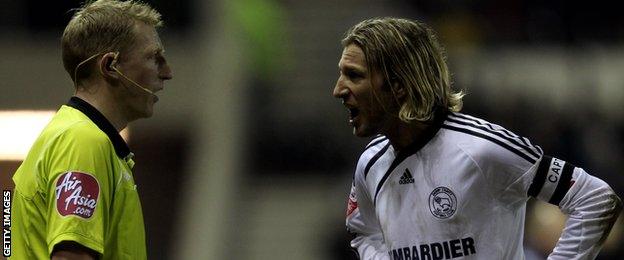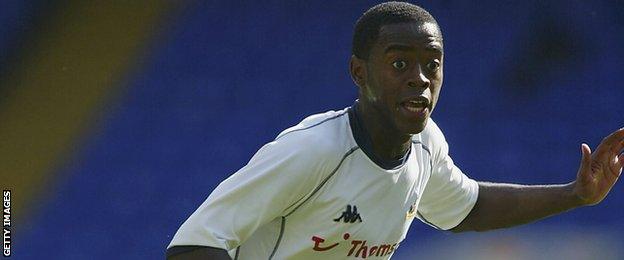Deadline day: The ins and outs of a transfer request
- Published

Transfer requests pose challenges for players, managers, chairmen and agents
With John Stones wanting to leave Everton for Chelsea and Saido Berahino eager to leave West Brom for Tottenham, BBC Sport examines the ins and outs of a transfer request.
Here's what might have happened if you were a player who wanted out of Chelsea Football Club in the 1980s:
You handed in your transfer request to the owner, Ken Bates. Bates read your transfer request. Bates pulled your contract from his filing cabinet. Bates slammed it on his desk. Bates roared: "It says here you've got two more years at Stamford Bridge! Get out of my office!" You got out of Bates's office. Sharpish.
The Chelsea player this story relates to, who shall remain anonymous, stayed at Stamford Bridge for another year, his game presumably severely compromised by his tail, dangling between his legs.
"This was an England international," says David Seligman, a football agent and sports lawyer who has worked with the player in question. "But he said handing in that transfer request to Bates was the scariest thing he's ever done."

Any player handing in a transfer request during Ken Bates' reign as Chelsea chairman was quickly shown the door
But the days of hovering outside the owner's office, like a sweaty schoolboy clutching a page of lines for the headmaster, are long since over. Roman Abramovich, who bought Chelsea from Bates in 2003, is a suitably scary successor. It's just that the modern player doesn't do his own dirty work.
"Players like to hide behind their agents, so they can get the blame if anything goes wrong," says Rachel Anderson, a football agent who also works for clubs, negotiating 'wantaway' deals for their players.
Transfer requests, staples of the media world's August silly season, during the run-up to the equally silly transfer deadline day, can take many forms. They can, in theory, be verbal; they can be emails; they can be scrawled in blood on the back of a discarded season ticket. But, normally, they will be letters drafted by agents or legal representatives, with a player's signature at the bottom.
The evolution of the football transfer |
|---|
Read BBC Sport's iWonder guide to the history of football transfers |
"You want it in writing, because a transfer request is essentially a breach of a player's contract," says Seligman.
"They can lead to payments becoming void, such as signing-on fees and loyalty bonuses, which are often paid over the course of a player's stay at a club. By signing that letter, a player is saying he is aware of that."
So a transfer request is a last resort for most players, especially those plying their trade in the lower divisions. Not because they want to avoid being accused of betrayal by disgruntled fans, but because of the financial implications.

In 2013 Robbie Savage's 11-point guide to gaining a transfer included tips like sulking, faking injury and undermining the manager
Former England Under-21 player Rohan Ricketts recently claimed he was so desperate to leave Arsenal for Tottenham in 2002, and felt so bound by his contract, that he owned up to stealing a team-mate's phone when it wasn't actually him. The club didn't believe him, but they released him anyway.
But Premier League superstars, to whom the surrendering of certain contractual payments means little, will usually attempt to negotiate a smoother exit.
"Usually a player will talk to the manager first and give his reasons for wanting to leave, not least because handing in a transfer request, especially if that club discovered and nurtured you, doesn't always look good," says Anderson.
"Sometimes there will be a figure written into his contract, and if an offer comes in in excess of that figure and the player wants to go, then he can go. But it's not always that lovely and simple. And if you can't have an amicable divorce, you have to deal with it legally."
When transfers go bad |
|---|
One of football's most bizarre transfer stories happened on deadline day of January 2013 when Peter Odemwingie drove 126 miles from West Brom to push through a move to QPR. |
The forward was turned away from Loftus Road when the club said no offer had been accepted for him. Then-Baggies manager Steve Clarke called Odemwingie's actions "total lunacy". |
For a club, the reason for rejecting an escalating series of bids and forcing a player to hand in a transfer request is obvious: if they are going to lose one of their most important players, they want to make sure they get as much money as possible for him.
But such brinksmanship has its downsides, because if you string the deal out until the very last minute, you might not have time to spend all that lovely money on replacement players until the next transfer window.
For a manager, a transfer request can feel like a dagger through the heart and causes all sorts of dilemmas. "You take it personally as a manager when a player asks for a transfer," says Barry Fry, who has managed a host of clubs below English football's top tier and is now director of football at Peterborough.
Stones at the perfect club - Martinez
"As an ex-player myself, I can understand why a player would want to better himself and earn more money somewhere else, because it's a short career.
"But you might have bought him from non-league football, you might have given him an opportunity when others didn't, so you feel a bit betrayed sometimes.
"Not only does it affect the player and the manager, it affects the whole club. If you accept a transfer request, the fans will say you've got no ambition. But most team-mates will understand why that player wants to go, so there will be sympathy if he doesn't.
"And if you turn down a transfer request, there's a risk that you'll lose a player mentally.
"You just have to hope a player has a bit about him, has a bit of a moan for five minutes and then gets on with his job.
"A couple of years ago, Celtic made three bids for Lee Tomlin on deadline day and Peterborough turned them down. He told the manager [Darren Ferguson] before the game against Crawley that he didn't want to play and put in a transfer request.
"It would have been a life-changing move. But the chairman just said: 'No, you can't go, we're top of the league.'
"We had problems with him for five minutes but he eventually got his head right and apologised."

Rohan Ricketts did eventually get his move to Tottenham, making 48 appearances from 2002-2005
To Steve Claridge, who played for 24 clubs before retiring in 2012, any talk of betrayal or greed is anathema, even if a transfer request is apparently a tactic to force an improved contract out of a club (as with Wayne Rooney, external and Manchester United in 2010 and Christian Benteke and Aston Villa in 2013).
"A risk for the player if his transfer request is turned down is that, if he starts playing badly, everyone now has a big stick to beat him over the head with," says Claridge, who remarkably never handed in a transfer request himself.
"Everyone now thinks he doesn't care about the club and doesn't want to be there. But there's disloyalty on all sides in football and clubs have no qualms about offloading players who have given them many years of service. You need to look after yourself in football, because no-one else will.
"John Stones is being offered a lot more money by Chelsea to do pretty much the same job, except it also has other bonuses, like possibly winning the Premier League and playing in the Champions League.
"Any Everton fan would do the same if they were in his position - and don't anyone tell me they wouldn't."

Wayne Rooney has said handing a transfer request to Manchester United in 2010 was the biggest mistake of his career
So a key part of an agent's job is evaluating a player's worth, which isn't always as high as a player might think it is. A 'big-time Charlie' will usually file for divorce knowing there are plenty of suitors queuing up to climb into bed with him. But the odd delusional clogger will want out of a perfectly acceptable arrangement having convinced himself something better will turn up.
"One player I had put in a transfer request, even though the club wanted to get rid of him anyway because he only had a year left on his contract," says Anderson. "He was desperate to leave but only wanted to join another Premier League club. Nineteen clubs said no, so that left us with just one club.
"I couldn't let the player know that because footballers have rather big egos and tend to get rather upset. And I couldn't let the club that wanted him know that because otherwise they would have had us by the whatsits.
"I got him a great deal, all the terms he wanted, doubled his salary, he should have been thrilled to bits.
"But after he had his medical at the 11th hour, he turned around to me and said: 'I really think I should be getting another few thousand a week.' I don't normally do this, but I showed him all the rejection letters, which made him realise he wasn't quite as good as he thought he was."
"I had one player who signed for a club at the end of June," says Seligman. "He was involved in all the pre-season friendlies, went on the pre-season tour, didn't play in the first league game of the season, got upset and told me he wanted to hand in a transfer request and move to Turkey for £20,000 a week more.
"I had to say no because he would have lost out on a 10-grand bonus. And I knew pretty much every League One club in England hated him."
Sometimes, even today, a footballer's contract is worth the paper it's written on.
- Published30 August 2015

- Published30 August 2015

- Published29 August 2015

- Published29 August 2015

- Published20 June 2016

- Published7 June 2019

- Published2 November 2018
